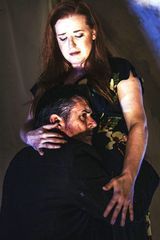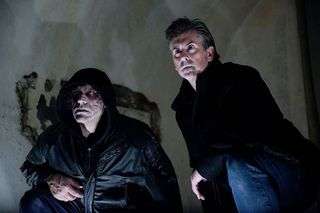|
Back
Tales from the Crypt New York
The Catacomb, Green-Wood Cemetery
10/10/2018 - & October 11, 12, 2018
Gregg Kallor: Sketches from Frankenstein – The Tell-Tale Heart
Jennifer Johnson Cano (Elizabeth from Frankenstein; Narrator from The Tell-Tale Heart), Brian Cheney (Victor Frankenstein), Joshua Jeremiah (*)
Joshua Roman (Cello), Gregg Kallor (Piano)
Sarah Meyers (Director), Tláloc López-Watermann (Lighting Designer), Cynthia Hennon Marino (Stage Manager), Fay Eva (Costume Designer)

G. Kallor (© Courtesy of the Artist)
“There is something at work in my soul, which I do not understand...I ought to be thy Adam, but I am rather the fallen angel...”
Mary Shelley, from Frankenstein
Composer Gregg Kallor had it exactly describing Mary Shelley’s Gothic novel as “staggeringly beautiful” when off the stage. The question last night was whether this “staggeringly” accomplished pianist, in the catacombs of the “staggeringly” immense Green-Wood Cemetery, could create the music that could justify his feelings.
Impresario Andrew Oursely had used Green-Wood before for fascinating concerts. But this was the first time, I believe, that the catacombs were used for two of the more ghostly stories in written history, though neither Frankenstein or Poe’s Tell-Tale Heart had a single ghost. Still, the genius of both writers was so overwhelming that no composer had ever successfully come near to their subjects.
Films, yes. Vincent Price, Christopher Lee, Boris Karloff–and yes, Gene Wilder and Peter Boyle–turned Frankenstein into horror or humor. And no major composer except Glass and Debussy ever got into Poe, for his words were superior in every way to other media.
Mr. Kallor had the right place for the premiere of his opera-to-be. The catacombs of Green-Wood Cemetery, candlelit, narrow, with hidden doors leading to hidden spirits, was the right place for a duo-drama (Frankenstein and Monster) and an even more sinister monodrama (Jennifer Johnson Cano as the narrator in Tell-Tale Heart.) And to his credit, Mr. Kallor used Poe’s words, and his own stunning piano with cellist Joshua Roman, along with ghastly/ghostly lighting to give the Poe a gripping re-telling.
Once again, the problem with Poe is that he is too good for other media. I prefer Poe to Stephen King for one reason: King transforms commonplace language into the language of the otherworldly. Poe uses only otherworldly language, so we are transported from the start.
Ms. Cano, though, appearing through a curtain in a hidden alcove at the back of the stage, was the deranged Narrator incarnate. Poe never mentions the gender, nor are we convinced of derangement. But the “confession” (originally to a mute listener) and the sounds of a beating-heart from a murdered man are...well, spooky.

B. Cheney, J.J. Cano (© Kevin Condon)
So was Ms. Cano. This was basically atonal music, yet Mr. Kallor and Mr. Roman were not averse to plucking that beating imaginary heart from piano and cello. Not exactly literally (Mr. Kallor is too subtle for that), but unconsciously. And Ms. Cano, in her fearful monologue, in her drama to the edge of the stage, to her visceral voice, made the Poe–in the Green-Wood catacomb–a thing of poetic horror.

J. Jeremiah, B. Cheney (© Kevin Condon)
Mr. Kallor’s Sketches from Frankenstein were part of an operatic project to turn the entire Gothic novel to the stage, certainly a first.
From the long long scena between Monster and Maker, we had an idea of what the opera will look like. This was no Karloff/Boyle Frankenstein. The “scary” part was baritone Joshua Jeremiah, with grotesque face, over-big trousers, a hoodie over his head, coming in from one of those hidden catacomb doors. Up to the stage he ambled to meet his silent Maker, Brian Cheney, and in words never uttered on the screen, he pleads for a “mate”, he quotes from Shakespeare (Ms. Shelley would never stoop that absurdly) and gives an anguished recitation/aria which is almost deafened by the complex music behind him.
Mr. Jeremiah was indeed appealing, his baritone was dark and beautiful, and he was the perfect foil to Mr. Cheney, a man as complex as his monster. That, perhaps, was the problem, for the characters here are not from Grimm Brothers. Like Ms. Shelley, they dealt with the limits of the mind, with technology, with that old cliché of when man becomes God.
The next love scene with Ms. Cano, was hardly inspired in libretto, though its simplicity was a respite from the start. Director Sarah Meyers had a stroke of genius when the Monster came out from a door standing motionless, menacing, an enigmatic figure near the audience, watching the relatively lovers.
In between, Mr. Kellor played a serious/jazzy tribute to Leonard Bernstein. It was bravura piano playing. But in between these literary/musico paeans to the Quick and the Dead, it was more superfluous than diverting.
Harry Rolnick
|